
DESIDOC Journal of Library & Information Technology
Scope & Guideline
Navigating the Future of Information Management Together
Introduction
Aims and Scopes
- Library and Information Science Research:
The journal publishes research that explores various aspects of library and information science, including user behavior, information retrieval, and the impact of digital resources. - Emerging Technologies in Libraries:
It emphasizes the application and integration of emerging technologies such as artificial intelligence, machine learning, and mobile technology in library services and management. - Digital Libraries and Open Access:
Focus is placed on the development and management of digital libraries, as well as the implications of open access publishing and its impact on research dissemination. - Information Literacy and User Education:
The journal addresses the importance of information literacy and user education, highlighting studies that evaluate user skills and the effectiveness of library instruction programs. - Bibliometric and Scientometric Studies:
It features bibliometric and scientometric analyses to assess research trends, citation patterns, and scholarly productivity across various disciplines. - Impact of Social Media and Web Technologies:
Research on the role of social media and web technologies in enhancing library services and user engagement is a consistent focus area.
Trending and Emerging
- Artificial Intelligence and Machine Learning Applications:
There is a rising trend in research exploring the use of AI and machine learning in libraries, particularly in areas like automated indexing, user services, and data analysis. - Digital Humanities:
The integration of digital humanities in library science has gained traction, focusing on how libraries can support digital scholarship and enhance access to digital cultural resources. - User-Centric Library Services:
Research emphasizing user satisfaction and feedback mechanisms in library services is on the rise, highlighting the importance of user experience in service design. - Impact of COVID-19 on Library Services:
The ongoing impact of the COVID-19 pandemic has led to increased research on how libraries adapted their services and resources to meet changing user needs during and after the crisis. - Open Data and Research Transparency:
Emerging studies are focusing on the importance of open data initiatives and their implications for research transparency, collaboration, and knowledge sharing among scholars.
Declining or Waning
- Traditional Library Management Practices:
There has been a noticeable shift away from traditional library management practices as the focus moves towards more innovative and technology-driven approaches. - Physical Library Services:
Research centered on physical library services and collections is declining as digital resources and online services take precedence in user preferences and library operations. - Plagiarism Studies:
While plagiarism remains a relevant concern, studies specifically focusing on plagiarism detection and control mechanisms have decreased, possibly due to the saturation of existing literature. - Print Resource Usage:
The exploration of print resource usage in academic libraries has waned as the emphasis on digital resources and e-books continues to grow. - Regional Language Publications:
Research focusing on regional languages in library and information science is becoming less frequent, with a shift towards more mainstream and widely-used languages in academic publishing.
Similar Journals

LIBRARY AND INFORMATION SCIENCE
Empowering librarianship through innovative research.LIBRARY AND INFORMATION SCIENCE is a specialized academic journal dedicated to the advancement of knowledge and scholarship in the field of library and information sciences. Published by MITA SOC LIBRARY INFORMATION SCIENCE, this esteemed journal has been a crucial platform for scholarly communication since 1980, addressing the dynamic challenges and developments in the information landscape. Although it holds a Q4 category ranking in the Library and Information Sciences according to the 2023 Scopus Ranking, the journal serves a unique niche, providing insights and fostering discussions among a diverse audience of researchers, professionals, and students. With no Open Access options currently available, its valuable research contributions are accessible through institutional subscriptions and library access. The journal aims to disseminate innovative research, case studies, and theoretical explorations that enhance our understanding of information behavior, retrieval systems, library management, and emerging technologies, thus promoting an informed society in an increasingly digital world. Given its focused scope and enduring presence, LIBRARY AND INFORMATION SCIENCE continues to be an essential resource for anyone invested in the future of libraries and information services.
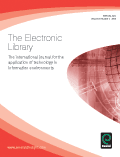
ELECTRONIC LIBRARY
Empowering Knowledge in the Digital AgeELECTRONIC LIBRARY, published by EMERALD GROUP PUBLISHING LTD, serves as a pivotal resource in the realms of Library and Information Sciences as well as Computer Science Applications. Established in 1983 and continuing through 2024, this journal showcases critical research and developments that shape modern information practices and the utilization of electronic resources. With a respectable impact factor positioning it in the Q2 quartile for Library and Information Sciences and Q3 for Computer Science Applications, the journal ranks #57 out of 280 in its field, reflecting its significance within the scholarly community. Authors are encouraged to contribute innovative studies that engage with current challenges and technological advancements, ensuring that the ELECTRONIC LIBRARY remains at the forefront of academic discourse. While the journal does not currently offer open access options, it remains an essential subscription-based resource for researchers, professionals, and students seeking to deepen their understanding of digital libraries and information management.
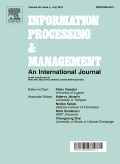
INFORMATION PROCESSING & MANAGEMENT
Pioneering Insights in Information ProcessingINFORMATION PROCESSING & MANAGEMENT, published by ELSEVIER SCI LTD, is a distinguished journal at the forefront of research in the fields of Computer Science, Information Systems, Library and Information Sciences, and Management Science and Operations Research. Since its inception in 1975, this journal has continually evolved to provide a scholarly platform for the dissemination of innovative methodologies and frameworks in information processing. With a remarkable Q1 ranking across multiple disciplines and esteemed Scopus rankings—notably, 1st in Media Technology and 4th in Library and Information Sciences—it stands as a pivotal resource for researchers, professionals, and students alike, seeking to advance their understanding and application of information management principles. Although not an Open Access journal, it remains widely accessed and respected, marking its influence in shaping the future of effective information management practices. The journal is committed to providing a rigorous peer-review process, ensuring the publication of high-quality research that addresses current challenges and trends in information technology and its application in various sectors.

AIB Studi
Advancing knowledge in Library and Information Sciences.AIB Studi is a vital peer-reviewed journal published by the ASSOC ITALIANA BIBLIOTECHE-AIB, focusing on the dynamic field of Library and Information Sciences. Since its inception in 2012, the journal has embraced an Open Access model, ensuring that research is accessible to a global audience without financial barriers. Based in Italy, AIB Studi promotes scholarly discourse and innovative practices in the library sector. With an emerging reputation reflected in its 2023 Quartile Rank of Q3 in Library and Information Sciences and a current Scopus ranking of #210/280, it serves as an essential resource for professionals, researchers, and students seeking to advance their knowledge and contributions to the field. The journal publishes articles that delve into the evolving role of libraries in society, explore technological advancements, and examine information management strategies, fostering an environment of collaboration and progressive development in library sciences.
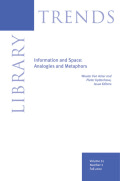
LIBRARY TRENDS
Navigating Contemporary Challenges in Library ScienceLIBRARY TRENDS is a leading academic journal published by Johns Hopkins University Press, dedicated to the field of Library and Information Sciences. With an established history spanning from 1980 to 2023, this peer-reviewed journal provides a platform for insightful research, innovative practices, and critical analysis addressing contemporary issues in library science. While it holds a respectable Q3 quartile ranking within its category, it ranks #145 out of 280 in Scopus, indicating its significance in the academic community. With an impact factor that reflects the growing importance of the field, LIBRARY TRENDS invites contributions that encompass a wide range of topics, including digital libraries, information technology, and user studies. Although it is not an open-access journal, the content it provides is invaluable for researchers, professionals, and students seeking to enhance their understanding and improve their practices in the rapidly evolving landscape of library and information science. Discover more by exploring the latest issues and join the vibrant discourse shaping our information ecosystems.
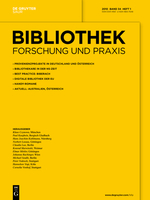
Bibliothek Forschung und Praxis
Pioneering Insights for Library ProfessionalsBibliothek Forschung und Praxis is a distinguished journal in the field of library and information science, published by WALTER DE GRUYTER GMBH. With its ISSN 0341-4183 and E-ISSN 1865-7648, this journal provides a vital platform for researchers, professionals, and students to explore the latest developments, innovative practices, and theoretical advancements in library research. Situated in the academic hub of Berlin, Germany, the journal encourages submissions that address a wide array of topics pertinent to libraries, archives, and information services, aiming to foster dialogue and collaboration within the global academic community. Although it currently does not offer Open Access options, the journal ensures rigorous peer-review processes uphold the integrity and scholarly quality of published works. With a commitment to enhancing the field of library science, Bibliothek Forschung und Praxis plays a crucial role in shaping best practices and promoting deeper understanding among scholars and practitioners alike.
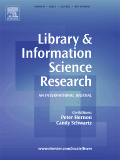
LIBRARY & INFORMATION SCIENCE RESEARCH
Navigating the complexities of information dissemination.LIBRARY & INFORMATION SCIENCE RESEARCH is a premier academic journal dedicated to advancing the field of library and information sciences. Published by Elsevier Science Inc, this journal has established its reputation for rigorous research and impactful scholarship since its inception in 1987. With an impressive Q1 ranking in Library and Information Sciences and a Q2 ranking in Information Systems for 2023, it reflects the growing importance of library sciences in an increasingly digital world. The journal serves as an essential platform for researchers, professionals, and students, offering insightful articles that address emerging trends and challenges in the realm of information dissemination and management. Although not an open-access journal, its contributions are widely recognized, as evidenced by its strong Scopus rankings, with a position of #53 out of 280 in Library and Information Sciences. If you are looking to deepen your understanding of the dynamic interplay between libraries, technology, and information systems, LIBRARY & INFORMATION SCIENCE RESEARCH is an indispensable resource in your academic journey.

RDBCI-Revista Digital de Biblioteconomia e Ciencia da Informacao
Connecting ideas in education and public administration.RDBCI-Revista Digital de Biblioteconomia e Ciencia da Informacao, published by the esteemed Universidade Estadual de Campinas, is a premier Open Access journal dedicated to advancing the fields of Library and Information Science, Education, and Public Administration. Since its inception in 2003, this multidisciplinary journal has aimed to provide a platform for high-quality research and discourse, contributing to the academic community both in Brazil and globally. With the E-ISSN 1678-765X, the journal addresses contemporary issues and innovations in information management, ensuring accessibility to a diverse audience. RDBCI holds a respectable position among its peers, boasting a Q3 ranking in Library and Information Sciences and various Q4 classifications in Education and Information Systems as of 2023. Scholars and practitioners are encouraged to submit their work, engage with research trends, and explore significant advancements in the discipline through this vital source of knowledge.
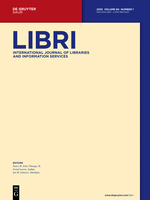
LIBRI-International Journal of Libraries and Information Studies
Transforming Perspectives on Libraries and InformationLIBRI - International Journal of Libraries and Information Studies, with ISSN 0024-2667 and E-ISSN 1865-8423, is a premier academic publication in the field of library and information science. Published by the esteemed Walter de Gruyter GmbH in Berlin, Germany, this journal has carved a distinguished place in academic discourse, earning a Q2 ranking in 2023 within its category, which underscores its impact and relevance to the community. With a comprehensive history spanning from 1950 and ongoing coverage until 2024, LIBRI provides a platform for rigorous research and innovative studies that advance the understanding of libraries and information systems globally. Researchers, professionals, and students are invited to engage with its diverse articles that cover a plethora of topics relevant to today’s information landscape. Although not an open-access journal, its contributions are valuable for those seeking to enhance their knowledge and stay updated in a rapidly evolving field.
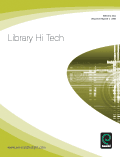
LIBRARY HI TECH
Exploring the Future of Library TechnologiesLIBRARY HI TECH is a distinguished peer-reviewed journal published by Emerald Group Publishing Ltd, offering a vital platform for researchers, professionals, and students in the fields of Library and Information Sciences and Information Systems. Since its inception in 1983, this journal has been instrumental in disseminating cutting-edge research and innovative practices, boasting an impressive Q1 ranking in Library and Information Sciences and a Q2 ranking in Information Systems as of 2023. Recognized globally for its robust scholarship, LIBRARY HI TECH holds significant positions in Scopus, ranking #22 out of 280 in Library and Information Sciences, placing it in the top 92nd percentile, and ranking #77 out of 394 in Computer Science — Information Systems, with an admirable 80th percentile. This journal not only enriches the academic dialogue but also contributes to the practical evolution of library technologies and information management, making it an essential resource for those keen on advancing their knowledge in these dynamic fields. With no open access, access is typically gained through institutional subscriptions or direct purchase, ensuring high-quality dissemination of research findings.